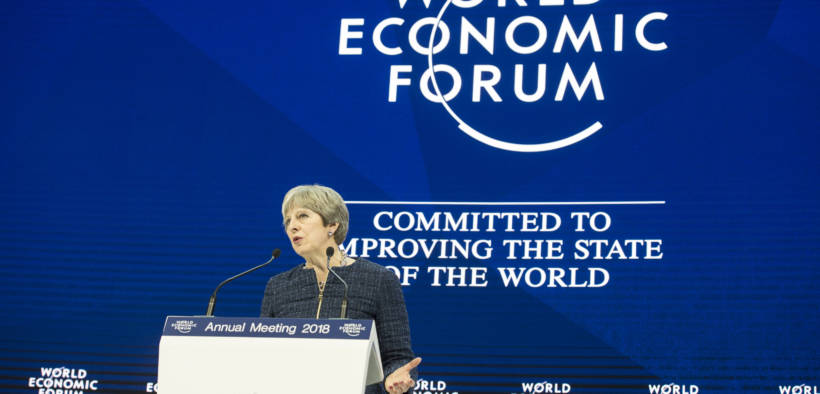Climate Change And Global Inequality Top Agenda At Davos World Economic Forum

The start of the World Economic Forum coincides with a new Oxfam report on global income inequality, which found that the richest 1% now hold more wealth than 6.9 billion people.
Climate change and extreme global inequality are likely to dominate the conversation at this year`s Davos World Economic Forum, as many of the world’s richest and most powerful figures will try to prove that they are taking action to address the world’s biggest problems.
The Washington Post notes that the possibility of a Sanders or Warren administration is a major topic of discussion at the conference. Billionaires and business leaders will try to steer the debate about solutions to climate change and extreme inequality away from measures the progressives have proposed, such as tax increases and antitrust action, reports the Post.
“Businesses are really concerned about the possibility of a far-left administration coming to power that would impose very different ways of operating,” Colin Mayer, a professor of management studies at the University of Oxford and a forum attendee, told the Post. “Young people have veered sharply leftward,” Greg Valliere, chief U.S. policy strategist at AGF Investments, wrote in a recent note to clients.
Climate activist Greta Thunberg will be at the conference, as will President Donald Trump, who refuses to publicly acknowledge climate change. Trump’s withdrawal from the Paris Agreement made the U.S. the only country in the world to not participate in the effort, and his administration’s expansion of fossil fuel production is likely to be a point of controversy at the forum.
The Post reports that many business leaders have taken some preliminary action in anticipation of future environmental regulations and a potential carbon tax, such as Blackrock CEO Larry Fink.
“Climate change has become a defining factor in companies’ long-term prospects,” Fink wrote in a widely publicized statement last week. “But awareness is rapidly changing, and I believe we are on the edge of a fundamental reshaping of finance.”
However, some critics doubt the sincerity of business leaders like Fink, and the Davos class has long been criticized of hypocrisy for hiding its wealth in tax havens, investing in fossil fuels, and taking private jets to the conference.
Extreme Inequality
While members of the forum widely agree about the need for more social programs to help address global inequality, the Post reports that “few here want to talk about paying more in taxes to fund these programs.” Dutch historian Rutger Bregman, who went viral after blasting CEOs, investors, and world leaders at the conference last year for evading taxes and failing to back up their rhetoric with action, was not invited to attend the 2020 event.
For some reason, I haven't been invited to Davos this year. Was it something I said? ?pic.twitter.com/6Qmrup7HrB
— Rutger Bregman (@rcbregman) January 20, 2020
The start of the World Economic Forum coincides with a new Oxfam report on global income inequality, which found that the richest 1% now hold more wealth than 6.9 billion people.
“If multinationals—and the super-rich—do not pay their fair share of taxes, governments cannot invest in access to education, healthcare, and decent pensions, or take measures to mitigate and adapt to the climate crisis,” said Magdalena Sepúlveda, commissioner of the Independent Commission for the Reform of International Corporate Taxation, in response to Oxfam`s report. “The impact is even greater for developing countries, as they rely more on corporate taxes. Furthermore, the tax burden is shifted to the poorest, usually through taxes regressive to consumption, such as value-added tax (VAT).”
The report emphasizes the massive amount of undervalued care work mothers do to maintain the global economic engine:
“Unpaid care work is the ‘hidden engine’ that keeps the wheels of our economies, businesses, and societies moving,” said Oxfam India CEO Amitabh Behar, who is in Davos this week. “It is driven by women who often have little time to get an education, earn a decent living, or have a say in how our societies are run, and who are therefore trapped at the bottom of the economy.”
The report also uses several striking analogies to put the scale of inequality in context.
“If everyone sat on their wealth piled up in $100 bills, most people would be sitting on the floor, a middle-class person from a rich country would be the height of a chair, and the world’s two richest men would be sitting in space,” notes wrote the Huffington Post.
“If you saved $10,000 a day since the building of the pyramids in Egypt you would have only one-fifth the average fortune of the five richest billionaires,” the report stated.
Some attendees at the conference agree with Oxfam`s argument that the global economic system needs to reformed to stop funneling the vast majority of income to the rich.
“The economic pie is bigger than it’s ever been before in history, which means we could make everyone better off, but we’ve chosen as a society to leave a lot of people behind,” Erik Brynjolfsson, director of the MIT Initiative on the Digital Economy and a forum attendee, told the Post. “That’s not just inexcusable morally but is also really bad tactically.”











